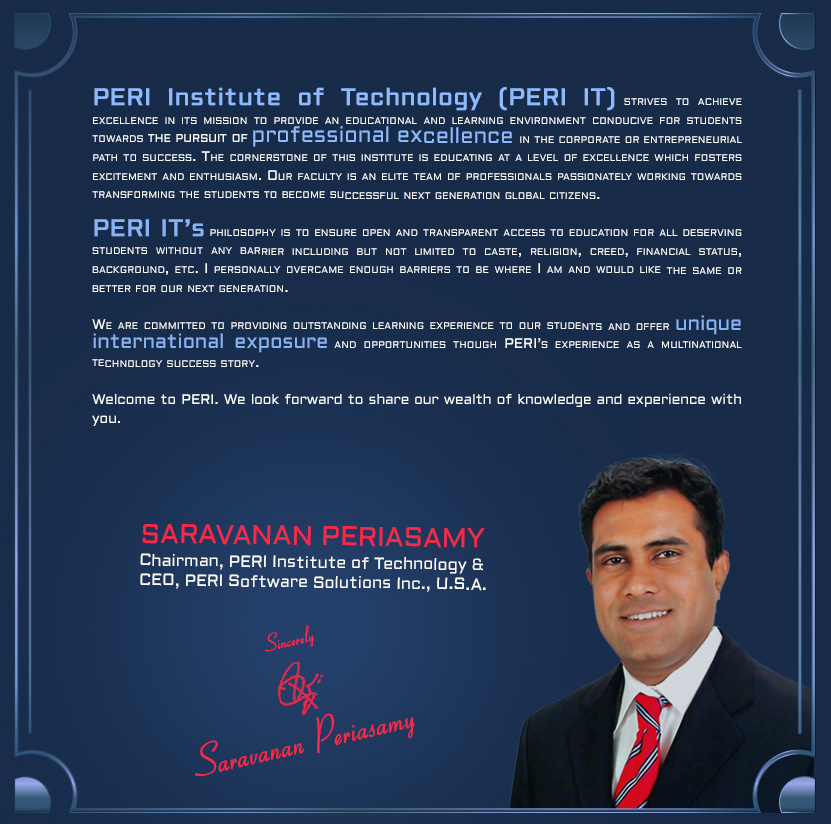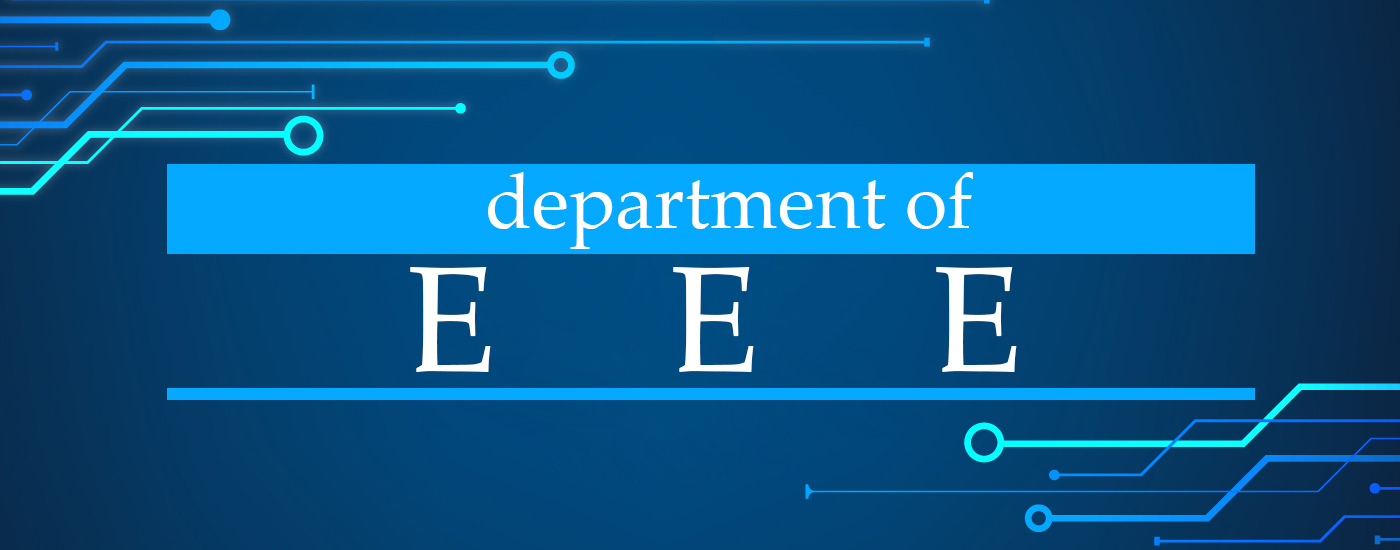S&H
Inauguration
Inauguration



“Electrical and Electronics Engineering” is the field where we deal with the energy that acts as a source for all mankind. The various forms are gas, fuel cell, turbine, hydro, solar, wind or geothermal energy.
EEE is the course in which we learn about power production, transmission and distribution, electrical machines and power electronics. Without electrical engineers, there is no power generation, and the trending industries, electronics and computers, would no longer exist. This explains the importance of electrical engineering in keeping the other industries sustained.
The course diversifies into various fields like the multimedia programmer, technical sales engineer, and project manager. It focuses on giving students practical training to work in laboratories, project and group work. These engineers are responsible for designing, developing and testing electrical equipment. The work profile after completing the course includes designing electronic components apart from software and network system. Students pursuing the course may explore career options in various domains like engineering works, construction, information technology, etc.
| PEO 1: | Graduates of the programme will become entrepreneurs, employees of reputed industries, pursue higher studies and researcher for developing advanced skills in Electrical and Electronics Engineering. |
| PEO 2: | Graduates of the programme will have multidisciplinary approach and ethical values for professional development to meet the societal needs |
| PEO 3: | Graduates of the programme will exhibit technical and intellectual competency and will be amenable for life-long learning |
| 1. | Engineering knowledge: Apply the knowledge of mathematics, science, engineering fundamentals, and an engineering specialization to the solution of complex engineering problems. |
| 2. | Problem analysis: Identify, formulate, review research literature, and analyze complex engineering problems reaching substantiated conclusions using first principles of mathematics, natural sciences, and engineering sciences. |
| 3. | Design/development of solutions: Design solutions for complex engineering problems and design system components or processes that meet the specified needs with appropriate consideration for the public health and safety, and the cultural, societal, and environmental considerations. |
| 4. | Conduct investigations of complex problems: Use research-based knowledge and research methods including design of experiments, analysis and interpretation of data, and synthesis of the information to provide valid conclusions. |
| 5. | Modern tool usage: Create, select, and apply appropriate techniques, resources, and modern engineering and IT tools including prediction and modeling to complex engineering activities with an understanding of the limitations. |
| 6. | The engineer and society: Apply reasoning informed by the contextual knowledge to assess societal, health, safety, legal and cultural issues and the consequent responsibilities relevant to the professional engineering practice. |
| 7. | Environment and sustainability: Understand the impact of the professional engineering solutions in societal and environmental contexts, and demonstrate the knowledge of, and need for sustainable development. |
| 8. | Ethics: Apply ethical principles and commit to professional ethics and responsibilities and norms of the engineering practice. |
| 9. | Individual and team work: Function effectively as an individual, and as a member or leader in diverse teams, and in multidisciplinary settings. |
| 10. | Communication: Communicate effectively on complex engineering activities with the engineering community and with society at large, such as, being able to comprehend and write effective reports and design documentation, make effective presentations, and give and receive clear instructions. |
| 11. | Project management and finance: Demonstrate knowledge and understanding of the engineering and management principles and apply these to one's own work, as a member and leader in a team, to manage projects and in multidisciplinary environments. |
| 12. | Life-long learning: Recognize the need for, and have the preparation and ability to engage in independent and life-long learning in the broadest context of technological change. |
Graduates will be able to
The department consists of well equipped laboratories having modern infrastructure with different types of AC and DC machines. The laboratory is furnished with Special machines, Measuring equipments, Power Electronics components, and Control system equipments.
The Major labs are:
| S No. | Company | Brand Logo | Type | Department | MOU pdf |
| 1 | 3Edge Solutions |  |
IT | EEE | Click Here |
| 2 | APT Training Solutions |  |
IT | EEE | Click Here |
| 3 | Aqua Pure Pvt Ltd |  |
CORE | EEE | Click Here |
| 4 | Datalogics India Private Limited |  |
CORE | EEE | Click Here |
| 5 | Gamma Process Hub |  |
ITES | EEE | Click Here |
| 6 | LITE Academy |  |
IT | EEE | Click Here |
| 7 | Soft Solutions 4 U |  |
IT | EEE | Click Here |
| 8 | Sparkle Soft Systems Private Limited |  |
IT | EEE | Click Here |
| 9 | Vega Intellisoft |  |
IT | EEE | Click Here |
| 10 | Ways Open Academy |  |
IT | EEE | Click Here |
S&H
Inauguration
IQAC
Motivational Talk
PERI
TECH EXPO'23
ELC
Event
EEE
Memorandum Of Understanding
CHS
Seminar
EEE
One Week Workshop
YRC
Event
EEE
Industrial Visit
EEE
National Level Seminar
EDC & IIC
Workshop
S&H
Event
R&D
Seminar
CHS
Seminar
CHS
Seminar
EEE
Guest Lecture
CHS
Seminar
EDC & IIC
Internal Hackfest'23
EEE
Seminar
CHS
Seminar
YRC
Awareness Program
R&D
Seminar
S&H
Guest Lecture
IQAC
Seminar
PERI
Teachers Day'23
PERI
National Tech Expo'23
EEE
National Level Seminar
EDC & IIC
MOU
Inaugural
First Year 2023
S&H
ICCTAS'23
PERI
MARATHON
PERI
CHAMPIONS TROPHY
PLACEMENT
EVENT
CENTRE FOR RESEARCH
Seminar
S&H
Guest Lecture
S&H
Competition
CIVIL & EEE
Poster Expo
DISASTER
AWARENESS
ICCET'23
Placement
Workshop
EEE
Workshop
EEE
Seminar
ECE & EEE
Event
EEE
Paper Presentation
IIC
Seminar
SCIENCE DAY'23
EEE
Workshop
Annual
Sports Meet 23
R&D
FDP
IIC
Seminar
EEE
MOU
EEE
Seminar
CHS & CGC
Seminar
EDC & IIC
Seminar
R&D
Workshop
SDC
YOUTH DAY'23
IQAC
FDP
EDC & IIC
FDP
IQAC
Workshop
R&D
Seminar
EEE
Webinar
CHS
2020
EDC-EEE,CSE
2020
ICIRCC
2020
EDC
IDEA FEST
EEE
NLC
EEE
Seminar
IPR
Workshop
5th
Graduation day
ICIRCC
2019
Women's
Day
EEE
PLA
EEE
RENEWABLE ENERGY
EEE
Electrical
EEE
SCOPE
ICIRCC
’18
WEC
Seminar
Club
TECHNICAL
SEMINAR ON
PLC, HMI
& SCADA
INDUSTRIAL &
VISIT
EEE &
INPLANT TRAINING
Power
Information-17
Sponsorship
NYC
Placement
Day 2017
Gold Medal &
Cash Award
Symposium -
Experitz 2K15